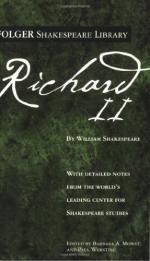|
This section contains 12,727 words (approx. 43 pages at 300 words per page) |

|
SOURCE: Spiekerman, Tim. “King Richard II.” In Shakespeare's Political Realism: The English History Plays, pp. 59-90. Albany: State University of New York Press, 2001.
In the following essay, Spiekerman maintains that Shakespeare questioned the institution of hereditary monarchy in Richard II, positing that Bolingbroke represents a rational and politically superior—if not entirely legitimate—alternative to a tyrannical hereditary ruler.
In King John, Shakespeare dramatized a political crisis brought on by a legitimacy dispute, which pitted the sitting king against the legitimate pretender and his French allies. The crisis was exacerbated by the worldly ambitions of the pope, who had his own designs on England. One hundred sixty-one years later, the man who possesses the English throne, King Richard II, is undeniably legitimate.1 And like the pope who plagued King John, Richard derives his authority directly from God. But Richard's double right to rule—both hereditary and divine—does...
|
This section contains 12,727 words (approx. 43 pages at 300 words per page) |

|


